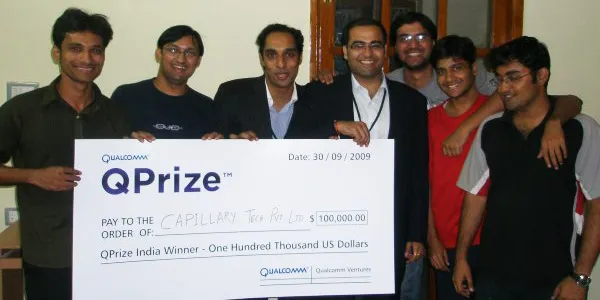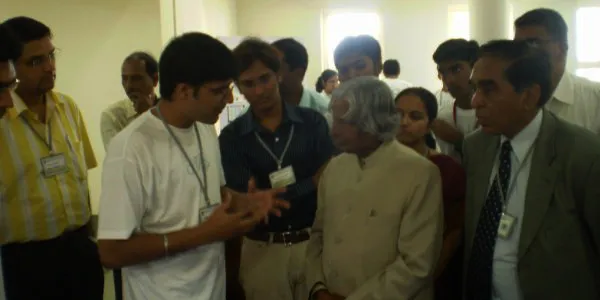[Techie Tuesdays] Shubham Malhotra - From making games to tinkering with Teewe
Shubham Malhotra always wanted to be an engineer though he never knew why. He attributes it to his love for “tinkering with machines”. Choosing between becoming a doctor or an engineer, he preferred the latter: being a doctor involved dealing with people but engineers dealt with machines. So engineering it was for Shubham. He worked with Capillary Technologies and Bharti Soft Bank, and is now the co-Founder of Teewe, a hardware for smart televisions.
When Shubam’s father was in law college Shubam’s grandfather faced a severe accident, and his father had to discontinue his LLB course to join the family business. But his father did not give up on his old dream, and took up studying law again when Shubham was in high school. So both father and son used to study together for their exams. Shubham’s mom being a teacher ensured the discipline at home.

Learning about bits and bytes
Shubham attributes most of his exploratory aptitude to his elder brother who used to tinker with every electrical and mechanical device that came his way. The brothers got together and created their own intercom system at home.
When in Class 11, Shubham moved to Kanpur for IIT entrance preparations. This was a new experience for him -- thousands of students studying together and classes in auditoriums. Though he cleared the prelims of IIT JEE, he could not clear the main entrance exam. Shubham tried BITSAT and got admission in BITS Goa. It was the second batch of BITS Goa, which in itself was like a startup of sorts. Shubham joined the computer club Bits and Bytes and this helped accelerate his learning in college.
Center for software development
Bored of the usual programming challenges, the students at BITS wanted to work on a ‘real’ software project. They got the approval to start a Center for Software Development at BITS Goa. This meant that Shubham and his friends would have their own lab with 24-hour access. They started building websites for other people. Shubham designed a voting software for the campus elections. In his first year at BITS Goa, he got interested in grid computing and implemented a cluster on campus.

Winning competitions
In his second year, Shubham participated in the Microsoft Imagine Cup. His team designed an AI Bot for education that could take questions from users and answer them. During the demo, while other teams were showing power point presentations, their team had a working demo ready. They requested four machines and created a mini-cluster and had the demo. They won second place in the Imagine Cup. Says Shubham: "We won around Rs 80,000, which was a lot of money for four people."
Next Shubham and his team participated in a hacking competition hosted by IIT Kanpur. They worked all night to find loopholes in a system but managed only the 27th position. But there was an error in the system because of an oversight by the organisers. Shubham and his team threw an open challenge to all the participants to go through their code and find loopholes. They were finally ranked first.
Placement Hassles
Shubham did not get placed during the recruitment season. An offer from CSC with a delayed joining date and another unmaterialised one from Microsoft Research was all that he got. There was a prospect with BHEL, but he was not keen on joining public sector companies.
As a result, he along with his friends started White Hat Security, a company that conducted security workshops in schools and colleges. They even prepared a brochure for the NIT Kurukshetra annual fest. But that never happened as some people left the team to take up regular jobs.
Working for Capillary
During this time Shubham met Krishna, the CTO of Capillary, who convinced Shubham to join him. He started off with installing the client software at different shops in Delhi.
Once, a company shipped a broken CD from Kolkata which had the client-side software and instructions to install them. There was no time to ship another one. But Shubnam knew just how to save the day. He went to Delhi, deposited his luggage in a cloak room, and headed straight to a cyber cafe to download the software on a pen drive.
Shubham worked for Capillary for three years and helped the company grow from less than 10 employees to over 70 people. But the projects were getting monotonous and Shubham quit Capillary and joined Bharti Soft Bank. They were opening up an office in Bangalore and Shubham was the right person for the job. Over there, he developed an android game called Songquest. The game eventually went to get a million downloads.
Starting Teewe
It was during his time at Bharti Soft Bank, that he came across the problems faced by smart TV users. The remote wasn't as friendly as one would want it to be. There was a problem integrating the remote with the keypad. Shubham started tinkering around and came up with a box that enabled users to control their smart TV easily.
“However, the box was quite big so we had to cut down on the size. After much iteration, we finally arrived to the size of a dongle. The problem of sending inputs to the TV was solved by the smartphone, which would interact with the device and thus control the TV. And Teewe was born,” he says.
Future Plans
Shubham finds working on Teewe exciting as this is the first hardware product he has designed from the scratch. "This is what I intend to do my entire life; building products from scratch," he says.
To show how serious he is about building, at Teewe interns are gifted Arduino USB boards. And his advice to students is in sync with this:
Go ahead and build stuff. Don't wait for your semester projects to come. This is the best way to learn.


![[Techie Tuesdays] Shubham Malhotra - From making games to tinkering with Teewe](https://images.yourstory.com/cs/wordpress/2015/04/shubham-2.jpg?mode=crop&crop=faces&ar=2%3A1&format=auto&w=1920&q=75)
